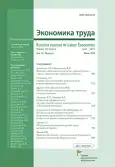Social orientation of the state family and demographic policy in the Russian Federation
- Authors: Molchanov I.N.1,2,3, Otarova K.V.1
-
Affiliations:
- Lomonosov Moscow State University
- Department of Public Finance
- The Financial University under the Government of the Russian Federation
- Issue: Vol 10, No 6 (2023)
- Pages: 859-878
- Section: Articles
- URL: https://journals.eco-vector.com/2410-1613/article/view/607812
- DOI: https://doi.org/10.18334/et.10.6.117966
- ID: 607812
Cite item
Abstract
The article presents the authors' approach to the study of family and demographic policy pursued by the Russian state. The scientific problem of the study was to substantiate the relationship between the measures taken by the state in the family and demographic policy and the socio-economic situation of households. The purpose of the study was to identify the features of the family and demographic policy pursued by the state and substantiate recommendations for improving the effectiveness of the mechanism for economic regulation of relations in the sphere of family and demography. The measures and tools used by the state to implement the main provisions of the family and demographic policy are systematized. It has been established that the actions taken by the authorities and administration have a tactical orientation and are predominantly economic in nature. The purpose of family and demographic policy is to save the people and increase human potential. The scientific novelty of the study lies in the application of a systematic approach when considering the problems of the family as the most important sphere of society. Within the framework of comparative and content analysis, a comparison of various opinions of domestic and foreign researchers on the essential content and structural elements of family and demographic policy was made. Statistical information about the demographic and economic situation of families has been systematized. Factors counteracting the increase in the effectiveness of the social policy pursued in Russia have been identified. Based on an analysis of the opinions of scientists and the expert community, selective measures have been identified. The implementation of these measures will help improve the economic situation of Russian families in the medium term. The results of the study will be of interest to specialists in social and demographic development management and international cooperation.
About the authors
Igor Nikolaevich Molchanov
Lomonosov Moscow State University; Department of Public Finance; The Financial University under the Government of the Russian Federation
Email: 9392940@gmail.com
Karina Valeryevna Otarova
Lomonosov Moscow State University
Email: karinaotarova@anspa.ru
References
- Молчанова Н.П., Молчанов И.Н. Экономическая и финансовая политика: научные основы и практические аспекты. / Монография. - Москва: МАКС Пресс, 2020. – 308 c.
- Волгин Н.А. Государственная и муниципальная социальная политика. / коллектив авторов; под общ. ред. Н.А. Волгина. - Москва: КНОРУС, 2018. – 424 c.
- Синица А.Л. Демографическая и семейная политика в современной социальной политике: теоретические подходы, цели, механизмы реализации и оценка результативности (часть 1) // Уровень жизни населения регионов России. – 2022. – № 1. – c. 50–59. – doi: 10.19181/lsprr.2022.18.1.4.
- Синица А.Л. Демографическая и семейная политика в современной социальной политике: теоретические подходы, цели, механизмы реализации и оценка результативности (часть 2) // Уровень жизни населения регионов России. – 2022. – № 2. – c. 189–200. – doi: 10.19181/lsprr.2022.18.2.4.
- Синельников А.Б. Семейно-демографическая политика и пути повышения ее эффективности // Социология. – 2022. – № 2. – c. 162-173.
- Синельников А.Б. Семья и брак: кризис или модернизация? // Социологический журнал. – 2018. – № 1. – c. 95–113. – doi: 10.19181/socjour.2018.24.1.5715.
- Esping-Andersen G. The Three Worlds of Welfare Capitalism. - Cambridge: Polity Press, 1990. – 264 p.
- Меркулов П.А. Государственная семейно-демографическая политика // Власть. – 2016. – № 3. – c. 146-152.
- Рязанцев С.В., Рыбаковский Л.Л. Демографическое развитие России в XX–XXI веках: историческое и геополитическое измерения // Вестник Российской академии наук. – 2021. – № 9. – c. 810–819.
- Российский статистический ежегодник. - М.: Росстат, 2022. – 691 c.
- Мировые демографические перспективы: пересмотренное издание 2019 года. Оон. [Электронный ресурс]. URL: https://population.un.org/wpp/ (дата обращения: 20.04.2023).
- Ионцев В.А., Саградова А.А. Введение в демографию. - М.: ТЕ¬ИС, 2003. – 629 c.
- Coppola L., Di Laurea D. Persistent at-risk-of-poverty rate in Italy (2007—2010) // Net-Silc2 Working Paper. – 2014. – № 3.
- Кауфман Н.Ю. Проблемы бедности в России: экономико-социальный аспект // Вопросы управления. – 2020. – № 5. – c. 36–45. – doi: 10.22394/2304-3369-2020-5-36-45.
- Макашина О.В. Роль финансовой системы в обеспечении развития государства: отечественный и зарубежный опыт. / монография., 2022. – 402 c.
- Fourarge D., Layte R. Welfare regimes and poverty dynamics: The duration and recurrence of poverty spells in Europe // Journal of Social Policy. – 2005. – № 34 (16).
- Гришина Е.Е. Различные аспекты бедности семей с детьми // Эко. – 2018. – № 3. – c. 7–26. – doi: 10.30680/ECO0131-7652-2018-3-7-26.
- Бобков В.Н., Гулюгина А.А. Мониторинг доходов и уровня жизни населения России – 2021 год. / [монография]. Вып. 5 (201) / В. Н. Бобков [и др.] ; отв. ред. В. Н. Бобков, А. А. Гулюгина. - М. : ФНИСЦ РАН, 2022. – 114 c.
- Молчанова Н.П., Молчанов И.Н., Гвозданный В.А. Поиск путей стабилизации экономических и финансовых отношений: глобальный контекст // Россия и современный мир. – 2023. – № 1. – c. 241-259. – doi: 10.31249/rsm/2023.01.14.
- Ростовская Т.К., Безвербная Н.А. Благополучная молодая семья: поиск баланса между самореализацией и демографическими стратегиями // Цитисэ. – 2022. – № 3(33). – c. 203–214. – doi: http://doi.org/10.15350/2409-7616.2022.3.18.
Supplementary files











